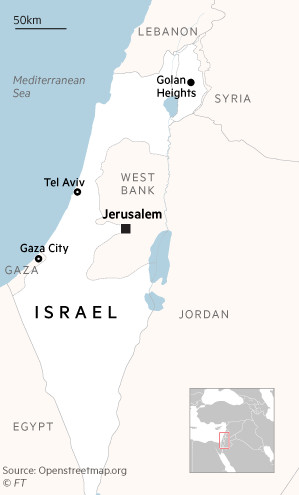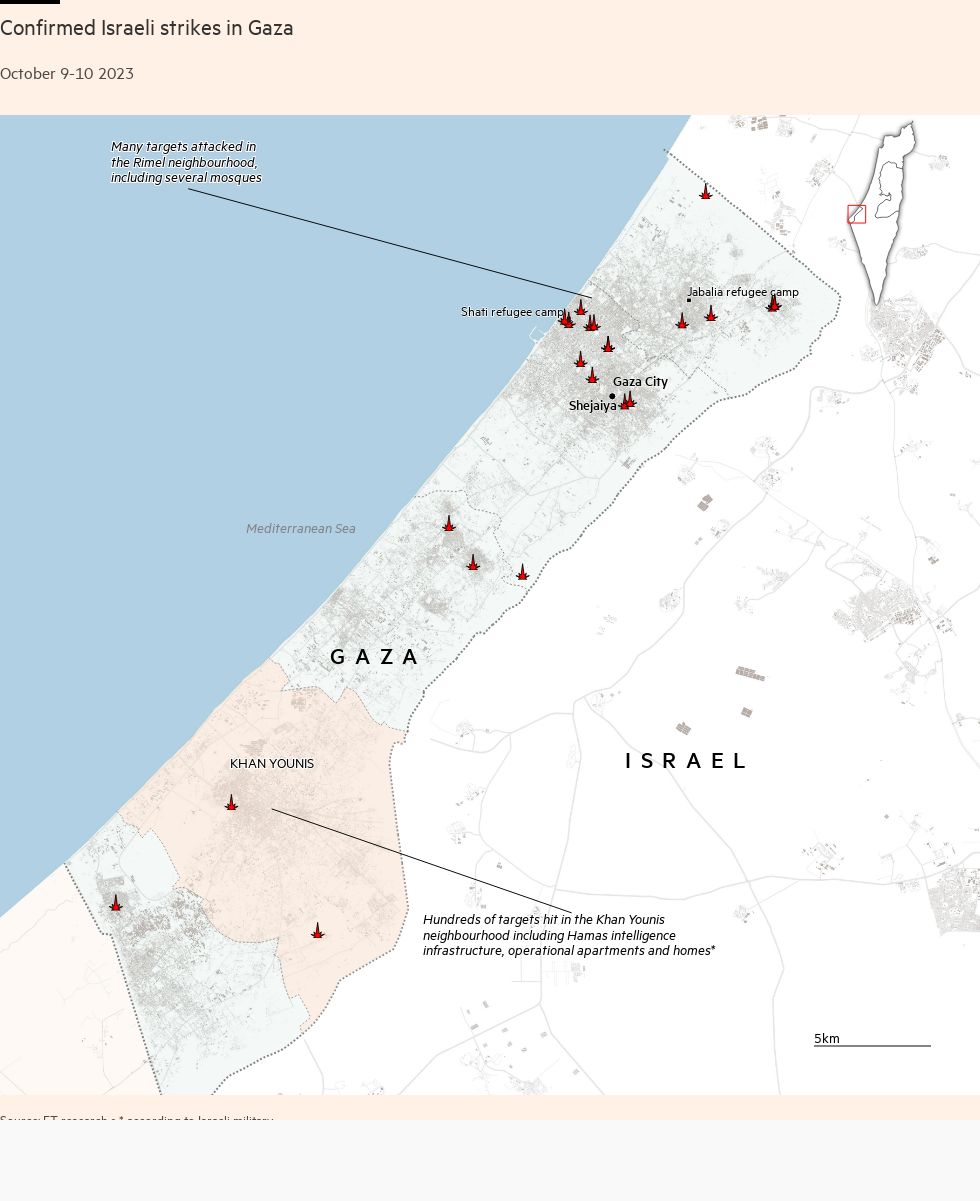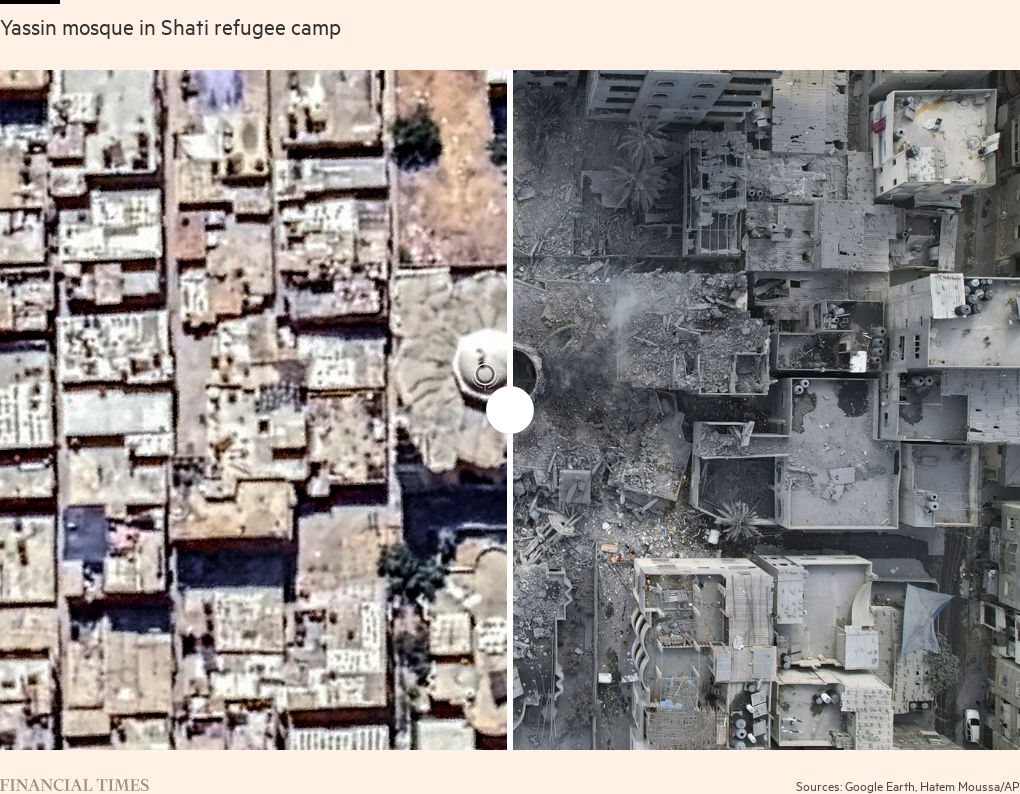Unlock the Editor’s Digest for free
Roula Khalaf, Editor of the FT, selects her favourite stories in this weekly newsletter.
Israel pounded the Gaza Strip and prepared for a ground invasion of the enclave, three days after an attack by Hamas triggered the bloodiest war on the country’s territory for decades.
The Israeli military said it had hit over 1,300 targets in Gaza to date in response to Saturday’s deadly incursion by the militant group, while more than 4,500 rockets had been fired from the enclave.
Israel-Palestinian conflict
As sirens warning of further rocket attacks sounded across Israel, with many missiles headed towards the city of Ashkelon, the country’s military said it had found the bodies of “dozens” of civilians, including infants and children, at a kibbutz near the Gaza border.
An Israeli Defense Forces spokesperson described the Kfar Aza site as “a massacre: children, women and elderly . . . were butchered”.
The kibbutz was one of the last sites where Israeli troops subdued armed Palestinian militants in fighting that continued into Monday morning. The spokesperson said that the casualties numbered in “dozens [and] we are still counting”.
For the third successive day Israel also shelled sites in Lebanon, its neighbour to the north, in response to a volley of rockets launched across the border.
As Israel prepared for a prolonged Gaza war, prime minister Benjamin Netanyahu’s Likud party said the ruling coalition had authorised him to negotiate the formation of an emergency government.
The country has called up 60,000 reservists in addition to a record 300,000 already mobilised, and deployed 35 military battalions and four divisions as it builds up “an infrastructure for future operations” — an apparent reference to an attack by land on Gaza.
More than 2mn people live in the Hamas-controlled enclave and tens of thousands have already fled their homes to seek shelter from Israeli strikes from the air and sea. According to the UN, the bombardment has displaced at least 200,000 people.
Youssef al-Aqqad, director of the European Gaza Hospital in Khan Younis in the south of the enclave, said the area had been shelled every day since Saturday, with 87 killed, including women and children.
“Houses and apartment blocks have been bombarded,” he said. “We write ‘unknown’ on the bodies. We hear the bombing every second.”
The IDF said the area near the Gaza border was now “more or less secure”, as it added that it had retrieved the bodies of 1,500 Palestinians who had stormed Israeli territory.
Israeli targets in Gaza included what the IDF said was a Hamas operational command centre in a mosque, an entry point for a tunnel used by militants and other “operational infrastructure” inside a second mosque.
The IDF also posted in Hebrew on X that it had killed Jawad Abu Shamala, Hamas’s finance chief, in an air strike.
The Financial Times could not independently confirm the claims. Israel accuses the Palestinian group, which took over Gaza in 2007, of embedding military infrastructure in civilian areas and religious sites.
Hamas has threatened to kill a hostage for each Israeli air strike that targets civilians in Gaza without prior warning.
The UN warned it expected that “a severe shortage of already scarce drinkable water” would affect more than 610,000 people in the territory, which Israeli authorities have cut off from water and electricity as part of a “complete siege”.
The IDF said more than 900 Israelis had been killed since Saturday’s incursion, with dozens more held hostage in Gaza. It added that 50 families had been notified that their relatives had been taken as hostages. Palestinian authorities said 830 of their citizens had been killed.

On Tuesday, the EU, the world’s biggest provider of support to the Palestinians, said it would continue aid payments until it had completed a review into whether the funds would be channelled to Hamas.
EU neighbourhood commissioner Olivér Várhelyi had claimed a day before that “all payments [were] immediately suspended”. But Brussels said he had not consulted fellow commissioners before posting on social media.
Additional reporting by James Shotter in Jerusalem and Max Seddon in Moscow
Credit: Source link












